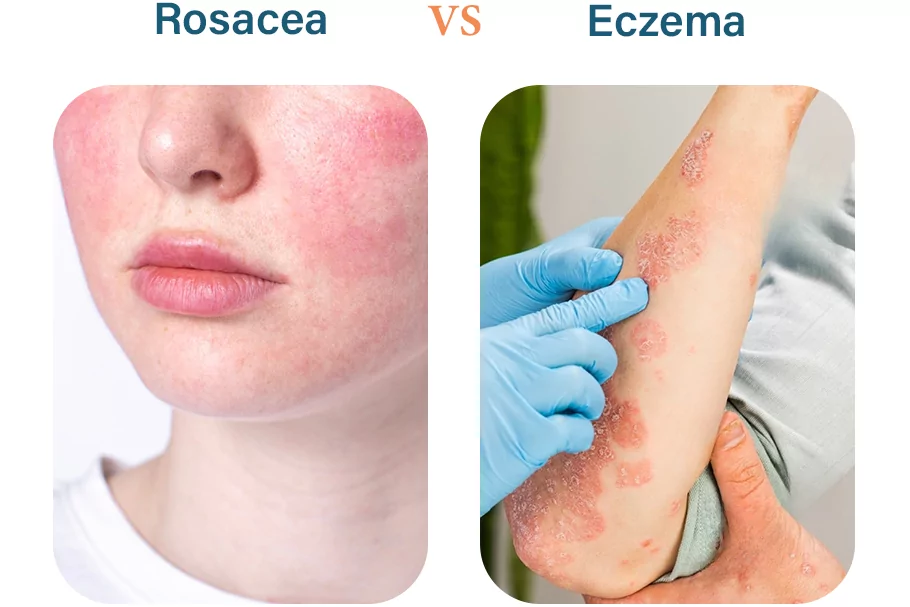
You notice you have irritated, red skin and wonder if you have sensitive skin or if it is something else. Can it be Eczema? Or Rosacea? Or What if it’s Psoriasis? Or could it be just a skin reaction? Don’t get confused, Dr. Eddie is here to save your day!
There are many common skin conditions that can affect your skin. Some of these have identical symptoms and may look similar. Two of these common skin conditions are rosacea and eczema.
Let’s dive deeper into this blog about Rosacea vs Eczema and discover their causes, symptoms, key differences, and how to manage them and get your healthy, glowing skin back.
What is Rosacea?
Rosacea is a chronic skin condition which means it can show up again and again throughout life as rosacea flare-ups. Rosacea usually appears on the face, mostly on the cheeks and nose. It may cause dry skin, redness, blushing, and flushing on the skin. Rosacea causes small blood vessels to be visible under the skin.
It can also cause pus-filled rosacea bumps on the face which may be confused with acne. The bumps and blisters associated with rosacea may be more visible on lighter skin tones than on darker skin tones, this is caused by skin pigmentation.
The exact cause of rosacea is still unknown but it is believed to be caused by the skin’s reaction to any bacteria. It is caused by internal inflammation in the body. According to some researchers, rosacea is also genetic and runs in families. Some common triggers that can make the condition worse are:
- Extreme temperature
- Stress
- Spicy food
- Sunlight
- Hormonal Changes
What is Eczema?
Eczema commonly known as Atopic Dermatitis affects almost 30% of the population in America. It is a chronic inflammatory skin condition. It usually causes the skin to become dry, red, irritated, and itchy. The skin may become cracked and painful.
The most common areas that may be affected by eczema are cheeks, knees, outside of elbows, wrists, and ankles. It can also appear on eyelids. It can also pop up as coin-shaped lesions in random locations, which is known as nummular eczema. Eczema may appear as red on lighter skin tones, while it may appear as purple on darker skin tones.
Eczema is believed to be caused by skin barrier dysfunction which means the skin is unable to lock moisture in the skin properly making it dry and dehydrated. There are several reasons that cause this dysfunction such as genetics, allergens, and stress.
Eczema can be mistaken for other common skin conditions such as psoriasis, ringworm, and seborrheic dermatitis.
Difference Between Eczema VS Rosacea
Rosacea and eczema may look similar but are two different skin conditions. Some of the key differences are
Key Points
| Rosacea | Eczema | |
| Redness | Yes | Yes |
| Itching | Yes | Yes |
| Dry skin | Yes | Yes |
| Flushing | Yes | No |
| Visible blood vessels | Yes | No |
| Crusty, scaly rash | No | Yes |
| Location | Cheeks, Skin folds, Hands, Knees, Elbows | Cheeks, Chin, Nose, Forehead |
| Most Common Age | Above 30 years | Begins in childhood and can persist through adulthood |
Symptoms of Rosacea vs Eczema
Some of the most prominent symptoms of Rosacea are
- Visible blood vessels
- Itchy skin
- Flushing
- Pustules and papules
- Thickening of skin
Some of the most common symptoms of Eczema are
- Dry skin
- Redness or purple discoloration
- Skin inflammation
- Rough patches of skin
- Swelling
- In some cases, the skin may ooze
Age
Both skin conditions can affect people of all ages, but eczema is more common in children, babies, and teens. Eczema is most likely to appear in childhood, but one may experience it in adulthood for the first time also known as adult-onset eczema. Eczema is chronic and may appear throughout life as eczema flare-ups.
However, rosacea is more common in adults and is less common in babies and children. It usually appears in the middle age or above 30 years of age. It may also reappear again and again as rosacea flare-ups.
Location
Rosacea is most commonly found on the face, on the cheeks, nose, forehead, and chin. It is visible on the nose bridge and cheeks as flushing and blushing. It is more notable in people with lighter skin tones.
Eczema usually appears on the inside and outside of elbows, knees, cheeks, eyelids, around the mouth, diaper area in babies, and hands. Eczema on hands is believed to be stress-related.
Treatments of Rosacea vs Eczema
Both these conditions are chronic and don’t have any permanent cure. But here are a few treatment options that you can observe to effectively manage them.
Treatment of Rosacea
Even though rosacea is incurable you can easily manage its symptoms and flare-ups by following a few simple steps:
- Cleansing the skin daily with a mild cleanser.
- Following a rosacea skincare routine and keeping the skin moisturized with a rosacea cream.
- Topical medications to reduce redness.
- Topical or oral antibiotics to manage pimples and blisters.
- Laser treatment
Remember, never use topical or oral medication without the consent of a doctor, as these can cause side effects and negative reactions in some people.
Treatment of Eczema
You can not get rid of eczema permanently, but you can easily manage its flare-ups and reduce their intensity by following an eczema skincare routine:
- Use an Eczema shampoo, face and body wash daily to cleanse the affected area.
- Keep your skin moisturized with an eczema cream at least twice a day, especially after taking a bath or shower.
- In severe cases, wet wrap therapy can ease the itching and irritation.
- If the condition does not improve after following the steps mentioned above then consult your healthcare provider or dermatologist and they may prescribe topical corticosteroids and antihistamines.
When To See The Doctor
Any skin condition when not treated properly can become worse, the same is the case with rosacea and eczema. If you notice that there is no change in your condition after using the in-home treatment and OTC products then it is best to consult the doctor.
If you are unsure about which skin condition you are experiencing it is a good idea to consult a dermatologist so they properly diagnose and provide you with the best treatment plan.
Conclusion
Rosacea and Eczema may look alike but are totally different skin conditions. The good news is both can be easily managed by following a proper skincare routine.
The best moisturizer for rosacea is the one that doesn’t have harsh chemicals, is hypoallergenic, free of as many common skin irritants as possible. Dr Eddie’s Happy Cappy Moisturizing Cream is a great option to choose from.
Happy Cappy Two-Step Eczema Skincare Routine & Solution is A Pediatrician’s Solution® for relieving redness, itching, and irritation associated with eczema. It contains soothing ingredients and is paraben-free, and fragrance-free which makes it suitable for eczema-prone skin. It helps in protecting and restoring the skin barrier and keeps your skin hydrated all day long.
FAQs
Can eczema and rosacea look the same?
Eczema and rosacea may look the same as they both have similar symptoms like redness, dryness, and bumps.
Can you have rosacea and eczema at the same time?
Yes, in some cases people experience eczema and rosacea flare-ups simultaneously.
Can rosacea cause itching?
Yes, although it is uncommon for people with rosacea to experience itching. But in some cases, it can cause itchiness and irritation.
What other skin condition can be mistaken for rosacea?
Psoriasis could appear similar to rosacea. Consult a doctor for a proper diagnosis of the skin condition.
How long can rosacea last?
Rosacea flare-ups usually last for a few weeks or months with proper treatment. But it can persist and flare-ups may appear again and again throughout life.
